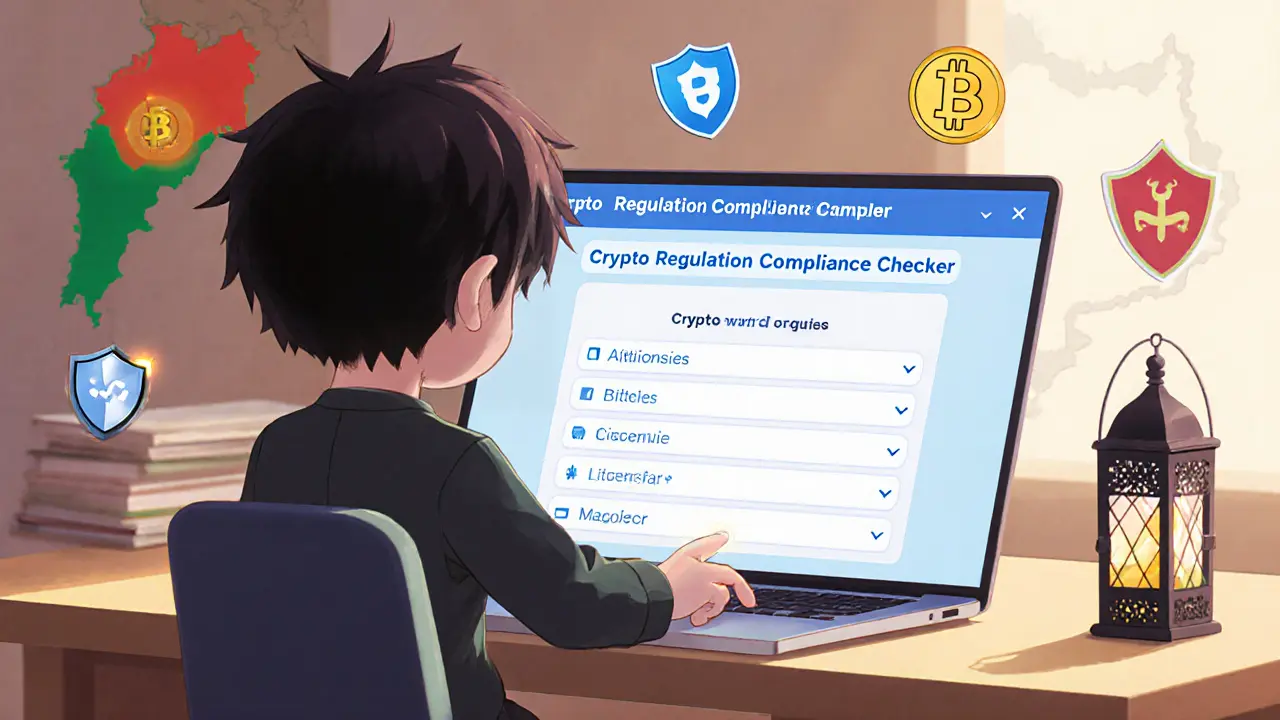Morocco Crypto Regulation Compliance Checker
Activity Type
Select the type of crypto activity you're considering to check its legality under Morocco's 2025 regulations.
Compliance Result
Penalty Overview for Crypto-Related Foreign Exchange Violations (2025)
| Violator Type | Offense | Fine Range (MAD) | Possible Additional Action |
|---|---|---|---|
| Individual | Unlicensed trading or holding crypto wallets | 20,000 - 100,000 | Criminal proceeding for repeat offenses |
| Corporate Entity | Operating an unlicensed exchange platform | Up to 500,000 | Business suspension & possible prosecution |
| Platform Operator | Failure to report AML/CFT suspicious activity | 100,000 - 300,000 | License revocation |
| Mining Operation | Any mining activity (hardware, cloud, or pool) | 200,000 - 1,000,000 | Equipment seizure and criminal charges |
When it comes to Morocco crypto regulations, the story is a roller‑coaster of bans, drafts, and new licensing rules that affect anyone who touches digital assets in the kingdom. If you’re an individual trader, a startup, or a foreign investor, you need to know which actions trigger foreign‑exchange violations, how penalties are calculated, and what steps keep you on the right side of Bank Al‑Maghrib and the Foreign Exchange Office.
Quick Takeaways
- Trading crypto is allowed only on platforms licensed by Bank Al‑Maghrib.
- Unlicensed activity can cost individuals up to MAD100,000 and firms up to MAD500,000.
- Mining remains illegal due to foreign‑exchange concerns.
- All crypto profits are subject to a 15% capital gains tax.
- Compliance hinges on KYC, AML/CFT reporting, and regular licensing renewals.
From Total Ban to Controlled Market (2017‑2025)
In November 2017 Morocco shut the door on every crypto transaction, labeling it a breach of the country’s long‑standing foreign‑exchange control laws. The ban was enforced jointly by Bank Al‑Maghrib and the Foreign Exchange Office. For eight years, enthusiasts drifted to peer‑to‑peer (P2P) channels and offshore OTC desks to stay connected to the global market.
Everything shifted in 2024 when Governor Abdellatif Jouahri announced a draft law that would legalise and regulate crypto use. By early 2025 the draft became law, carving out a narrow pathway for licensed exchanges while keeping the core ban on mining and commercial payments. The new framework still treats crypto transactions as foreign‑exchange activities, meaning they must respect the same monitoring and reporting standards as traditional currency flows.
Licensing & Compliance Essentials
To operate legally, any crypto platform must obtain a licence from Bank Al‑Maghrib. The licence obliges the platform to:
- Implement robust Anti‑Money Laundering (AML) and Counter‑Funding of Terrorism (CFT) procedures.
- Collect and verify customer data through mandatory Know‑Your‑Customer (KYC) checks.
- Monitor daily transaction volumes and flag any suspicious activity to the authorities.
- Report monthly capital‑gain figures so the tax office can apply the 15% levy.
Businesses that wish to accept crypto as payment for goods or services must still route cross‑border settlements through traditional banking channels. The law explicitly forbids using digital assets for international trade settlements, preserving the central bank’s grip on foreign‑exchange balances.
Penalty Structure for Foreign‑Exchange Violations
The enforcement arm applies steep fines that scale with the violator’s profile and the seriousness of the breach. Below is a snapshot of the current penalty regime.
| Violator Type | Offense | Fine Range (MAD) | Possible Additional Action |
|---|---|---|---|
| Individual | Unlicensed trading or holding crypto wallets | 20,000 - 100,000 | Criminal proceeding for repeat offenses |
| Corporate Entity | Operating an unlicensed exchange platform | Up to 500,000 | Business suspension & possible prosecution |
| Platform Operator | Failure to report AML/CFT suspicious activity | 100,000 - 300,000 | License revocation |
| Mining Operation | Any mining activity (hardware, cloud, or pool) | 200,000 - 1,000,000 | Equipment seizure and criminal charges |
These figures translate to roughly $2,000‑$10,000 for individuals and up to $50,000 for companies, underscoring the government’s resolve to keep foreign‑exchange flows under tight control.

What’s Allowed, What’s Forbidden
Below is a quick matrix that separates the permissible activities from the prohibited ones.
- Allowed:
- Buying and selling crypto on a licensed exchange.
- Holding crypto in personal wallets, provided the acquisition came from a licensed source.
- Participating in Initial Coin Offerings (ICOs) that have clearance from the Moroccan Capital Market Authority (AMMC).
- Forbidden:
- Running an unlicensed exchange or broker.
- Using crypto for cross‑border commercial payments.
- Any form of crypto mining, whether on‑site or cloud‑based.
- Facilitating peer‑to‑peer trades without reporting to the Foreign Exchange Office.
Practical Steps for Users & Businesses
Whether you’re a casual investor or a fintech startup, following a clear checklist helps you avoid costly violations.
- Verify the exchange’s licence - ask for the Bank Al‑Maghrib certificate and keep a copy.
- Complete KYC forms with your full legal name, Moroccan ID, and proof of address.
- Enable two‑factor authentication to meet AML best practices.
- Maintain a transaction log that records date, amount (in MAD), and counterparties.
- Report any suspicious inbound/outbound flow to the Foreign Exchange Office within 48hours.
- Declare crypto gains on your annual tax return; apply the 15% capital gains tax administered by the tax authority.
For businesses, an extra layer of compliance is the International Monetary Fund (IMF) framework that Morocco follows for foreign‑exchange stability. Aligning internal policies with IMF guidelines can smooth audit reviews and reduce the risk of regulatory surprises.
Emerging Trends: e‑Dirham and Regional Cooperation
The government is testing a sovereign digital currency called e‑Dirham. Unlike private crypto, e‑Dirham runs on a central‑bank ledger, making foreign‑exchange monitoring straightforward. The pilot aims to cut cash‑handling costs and eventually provide a state‑backed alternative for cross‑border payments, directly addressing the very concerns that sparked the original crypto ban.
Morocco is also collaborating with the Central Bank of Egypt and the World Bank on a second‑phase e‑Dirham pilot focused on international transfers. If successful, the initiative could reshape how Moroccan firms settle foreign trade, potentially easing some of the current crypto‑related restrictions.
Looking Ahead: Will the Rules Loosen?
Analysts predict two possible paths:
- Gradual liberalisation: As the licensing framework proves effective, authorities may expand the list of permitted activities, perhaps allowing crypto‑based invoicing for SMEs.
- Maintaining the status quo: If foreign‑exchange volatility spikes, regulators could tighten the caps on crypto trading volumes and enforce stricter reporting.
Key Takeaway
Morocco crypto regulations are anchored in foreign‑exchange control. Licensed trading is legal, mining is not, and penalties for violations are steep. Treat compliance as a continuous process, not a one‑off checklist.

Frequently Asked Questions
Is it legal to buy Bitcoin in Morocco?
Yes, but only through a platform that holds a licence from Bank Al‑Maghrib. Buying on unlicensed exchanges or via informal P2P channels is considered a foreign‑exchange violation and can lead to fines.
Can a Moroccan company accept crypto for overseas invoices?
No. Current law requires all cross‑border commercial payments to be settled in MAD through traditional banking channels. Accepting crypto for such payments would breach foreign‑exchange regulations.
What tax do I owe on crypto profits?
Profits are subject to a 15% capital gains tax. The amount must be declared on your annual tax return, and the tax authority can request transaction logs from your licensed exchange.
Is crypto mining allowed anywhere in Morocco?
Mining is completely prohibited. The ban is tied to foreign‑exchange concerns over electricity imports and equipment purchases. Violators face fines up to MAD1,000,000 and possible criminal charges.
How can I verify if an exchange is licensed?
Ask the exchange for its Bank Al‑Maghrib licence number and cross‑check it on the central bank’s official registry. Licensed platforms also display the licence badge on their website.







Mark Camden
July 20, 2025 AT 10:26Anyone who treats the 2025 Moroccan crypto framework as optional is overlooking the core principle of protecting our nation's monetary sovereignty. The law is crystal clear: only exchanges licensed by Bank Al‑Maghrib may operate, and any deviation invites severe penalties. This isn’t merely a bureaucratic hurdle; it’s an ethical responsibility to prevent money‑laundering and capital flight. By complying, traders demonstrate respect for both the law and the broader social contract that underpins economic stability. Ignoring these rules shows a reckless disregard for the collective good.
Evie View
July 20, 2025 AT 17:23The sheer audacity of those who flaunt unlicensed crypto trades in Morocco is infuriating. They sprint past the 20,000‑100,000 MAD fines like it’s a game, ignoring the real human cost of destabilizing our currency. Every illegal transaction chips away at trust in the financial system, and the authorities are justified in slapping down heavy penalties. It’s disgraceful how some think they’re above the law, while ordinary citizens bear the brunt of inflated costs and reduced confidence. The anger I feel is justified – this reckless behavior must be called out.
Jayne McCann
July 21, 2025 AT 00:20It’s funny how everyone praises the licensing regime, yet the same rules could stifle innovation and keep everyday Moroccans away from useful financial tools.
Richard Herman
July 21, 2025 AT 07:16Let’s remember that regulations are designed to protect both investors and the broader economy. By working with licensed platforms, users gain access to trustworthy services while respecting Morocco’s foreign‑exchange controls. Collaboration between regulators and the fintech community can foster a secure environment that encourages responsible growth. It’s a balance of safeguards and opportunity, and we should celebrate the progress made.
Parker Dixon
July 21, 2025 AT 14:13👍 Totally agree with the need for solid KYC and AML measures – they’re the backbone of a safe crypto ecosystem. If you’re a trader, keep your docs up‑to‑date, enable 2FA, and log every transaction. 📊 It also helps to regularly check that your exchange displays the official Bank Al‑Maghrib licence badge; that’s your green light. And don’t forget the 15 % capital gains tax – file it on time to avoid nasty surprises. 🌟 Staying compliant not only keeps you out of trouble but also builds confidence in the market for everyone.
Stefano Benny
July 21, 2025 AT 21:10While the emotional outburst is understandable, let’s dissect the risk matrix: unlicensed trading introduces AML blind spots, liquidity fragmentation, and regulatory arbitrage. The penalty escalation curve (20K→100K MAD) is a deterrent calibrated to systemic exposure. 🤖 In practice, compliant platforms integrate transaction monitoring APIs (
STIXfeeds) that flag anomalous flows in real‑time. Ignoring these protocols isn’t just reckless; it undermines the integrity of the entire crypto value chain.Bobby Ferew
July 22, 2025 AT 04:06Indeed, cooperation sounds ideal in theory, yet the day‑to‑day reality for many locals is navigating a labyrinth of paperwork that feels more punitive than protective. The “trust” you mention often translates into an additional compliance burden that can deter small‑scale entrepreneurs. While the intention may be benign, the implementation sometimes borders on over‑regulation, inadvertently pushing users toward informal P2P channels.
celester Johnson
July 22, 2025 AT 11:03One might ponder whether the true violation lies not in the act of unlicensed trading, but in the human yearning to bypass imposed boundaries. When a society codifies financial behavior, it reflects a collective belief in order; to transgress is to challenge that very belief. Yet, every act of defiance seeds a dialogue about freedom versus control, echoing age‑old philosophical debates. In the Moroccan crypto context, the pendulum swings between safeguarding national stability and stifling individual autonomy.
Nathan Blades
July 22, 2025 AT 18:00Listen up, friends! The road to crypto compliance in Morocco isn’t a dead‑end; it’s a launchpad for responsible innovation. By embracing licensed exchanges, you’re not just avoiding fines-you’re championing a transparent market that can attract global partners. Think of the possibilities: secure cross‑border payments, thriving fintech startups, and a healthier economy for all. Let’s turn the narrative from restriction to empowerment, and together we’ll pave the way for a brighter digital future!
Somesh Nikam
July 23, 2025 AT 00:56Absolutely, Nathan! 😊 Your enthusiasm captures the spirit we need. By staying diligent with KYC and reporting, we protect both ourselves and the broader ecosystem. It’s all about building trust step by step, and every compliant transaction adds a brick to that foundation. Keep the momentum going, and remember we’re all in this together.
katie littlewood
July 23, 2025 AT 07:53The journey toward full compliance in Morocco’s crypto landscape is, in many ways, a vibrant tapestry woven from threads of regulation, innovation, and collective ambition. Each thread, whether it be the strict licensing requirements set forth by Bank Al‑Maghrib or the diligent record‑keeping demanded of individual traders, contributes to a picture that is as complex as it is beautiful. When a newcomer steps into this arena, they are greeted by a chorus of guidelines that, at first glance, may seem overwhelming, yet these very directives are the scaffolding that supports sustainable growth. The requirement to obtain a licence, for instance, is not merely bureaucratic red tape; it serves as a badge of credibility that reassures both users and regulators alike. Moreover, the mandatory KYC and AML procedures function as guardians at the gate, ensuring that illicit funds do not seep into the mainstream economy. In practice, this translates to a series of practical steps: gathering identification documents, verifying residential addresses, and maintaining meticulous transaction logs that capture the rhythm of each trade. The 15 % capital gains tax, while appearing steep, is a transparent mechanism that channels revenue back into public services, reinforcing the social contract between the state and its citizens. It is also worth noting that the penalties for non‑compliance, ranging from modest fines to severe criminal proceedings, act as a deterrent that preserves market integrity. By internalizing these mechanisms, traders not only safeguard themselves from legal repercussions but also contribute to a culture of accountability that elevates the entire ecosystem. As the e‑Dirham pilot gains momentum, it may usher in a new era where state‑backed digital currency coexists harmoniously with private crypto assets, further enriching the monetary tapestry. Such evolution will likely demand even greater collaboration between regulators, fintech innovators, and the broader community, fostering a dialogue that is both inclusive and forward‑looking. In this spirit, educators and mentors play a pivotal role, guiding novices through the labyrinth of compliance with patience and clarity. The collective effort required is akin to a symphony, where each instrument-be it the individual trader, the licensed exchange, or the regulatory body-must play its part in perfect harmony. Ultimately, embracing compliance is not a sacrifice; it is an investment in a resilient, thriving financial future that benefits everyone involved. Let us, therefore, celebrate the milestones we achieve and remain steadfast in our commitment to a responsible, vibrant crypto economy.
Jenae Lawler
July 23, 2025 AT 14:50While many laud the newfound regulatory clarity as a triumph of modern governance, one must question whether such top‑down imposition truly serves the interests of the Moroccan citizenry or merely reinforces a technocratic hegemony that marginalizes grassroots financial empowerment.
Chad Fraser
July 23, 2025 AT 21:46Compliance isn’t a chore-it’s the key to unlocking crypto’s potential in Morocco.